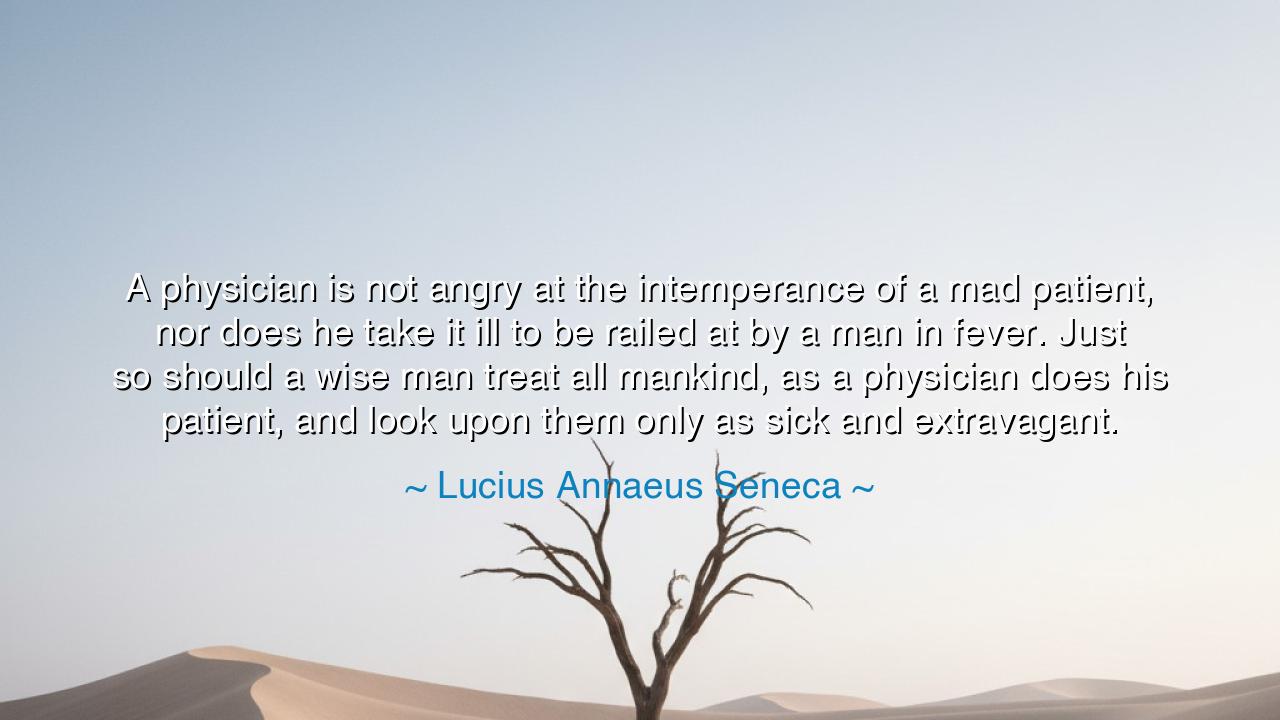
A physician is not angry at the intemperance of a mad patient
A physician is not angry at the intemperance of a mad patient, nor does he take it ill to be railed at by a man in fever. Just so should a wise man treat all mankind, as a physician does his patient, and look upon them only as sick and extravagant.






Hear now the words of Lucius Annaeus Seneca, the Stoic sage of Rome, who declared: “A physician is not angry at the intemperance of a mad patient, nor does he take it ill to be railed at by a man in fever. Just so should a wise man treat all mankind, as a physician does his patient, and look upon them only as sick and extravagant.” In this utterance, Seneca gives us not merely counsel for patience, but a vision of how the wise must endure the faults of others. For the one who understands the frailty of the human condition cannot be stirred to wrath by the sickness of the soul. He sees folly, anger, and cruelty as diseases, and he treats them with compassion rather than rage.
The origin of this saying lies in the very heart of Stoicism, which teaches that our peace must not be governed by the storms of others, but by the mastery of our own mind. Seneca, who lived amidst the intrigues and violence of Nero’s court, knew well how easily one could be provoked by the folly and fury of men. Yet he counseled restraint, for he saw that to answer madness with anger is to become mad oneself. Just as the physician does not curse his patient, but seeks to heal, so too must the wise man respond not with hatred, but with reason and pity.
Consider the life of Socrates, who, when condemned unjustly to death, bore no hatred toward his accusers. He saw them as men blinded by ignorance, afflicted by the disease of injustice. He could have railed against them, but instead, he drank the cup of hemlock with calm, choosing to remain steadfast in his virtue rather than corrupted by their malice. Socrates lived out Seneca’s teaching centuries before: to see mankind not as evil, but as sick, and therefore to answer them not with fury, but with understanding.
The wisdom of Seneca shines especially in times of strife. In every age, men have been quick to take offense, to rise in anger when wronged. Yet the Stoic knows that anger is poison to the soul, just as fever is poison to the body. The true physician of the spirit does not join the illness but seeks to heal it. To view cruelty as sickness is to transform one’s response from vengeance to mercy, and from bitterness to strength. In this lies the difference between the common man and the sage.
Think, too, of Abraham Lincoln, who during the American Civil War bore insult and criticism with patience. When his generals failed him or his rivals mocked him, he did not let anger consume his judgment. He saw his nation as afflicted with a great sickness—slavery and division—and sought not to curse it, but to heal it. “Do I not destroy my enemies when I make them my friends?” he said, echoing the Stoic ideal. Here again is Seneca’s wisdom embodied: the wise man does not return anger for anger, but acts as a physician to the wounded soul of mankind.
O children of tomorrow, let this lesson temper your hearts. When others speak harshly, when they wrong you in their folly, do not be quick to wrath. Say to yourself: “They are sick, not evil. Their rage is their fever, their cruelty their delirium.” Respond not with venom but with calm, for in your calm lies your strength, and in your patience lies your freedom. To be provoked is to be conquered; to remain steadfast is to be victorious.
Practically, let your life reflect this wisdom. In your household, when words of anger arise, answer softly, remembering the fevered patient. In your labors, when injustice stirs against you, act with firmness but without hatred. In the world, when you see cruelty, remember that it is the sickness of the spirit, and ask how it may be healed. In this way, you will walk not as one enslaved by the passions of others, but as a physician of the soul, strong and unshaken.
Thus, Seneca’s words resound across the centuries: the wise man must treat mankind as the physician treats the patient. See not an enemy, but a sufferer; see not malice, but illness. In doing so, you will preserve your peace, elevate your spirit, and perhaps even bring healing to a wounded world.






AAdministratorAdministrator
Welcome, honored guests. Please leave a comment, we will respond soon